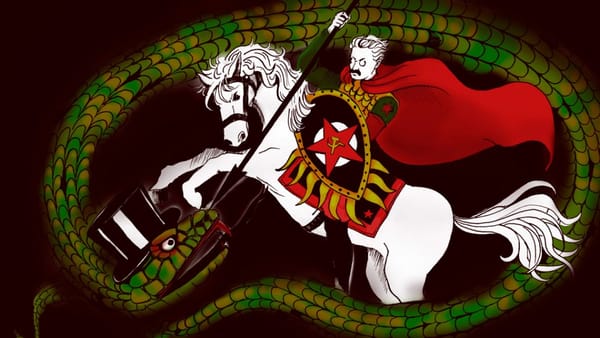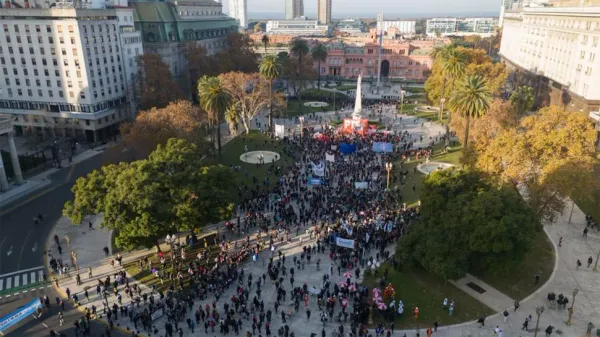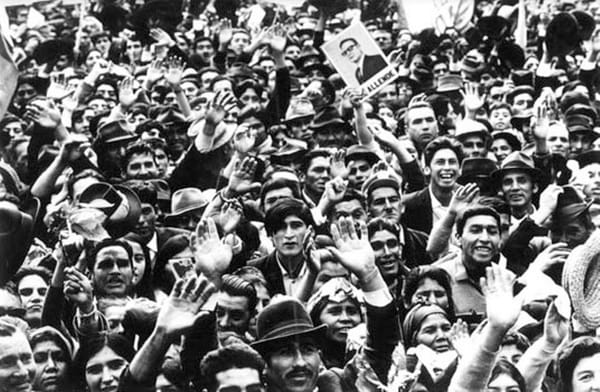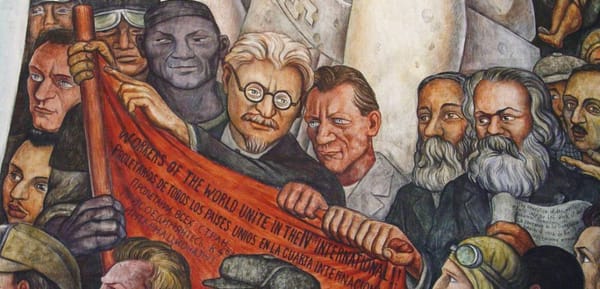Cristina, Corruption and the Argentine Left
The Argentine Left has in large part capitulated totally towards a Popular Front in the aftermath of a court judgement condeming former president Cristina Kirchner of corruption.
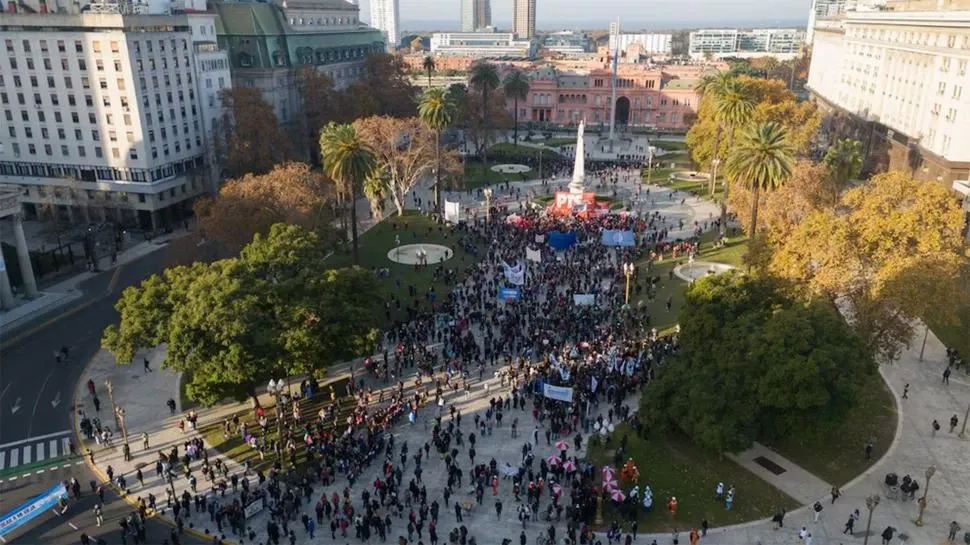
The Case
On June 10th Argentina’s Supreme Court rejected an appeal by Cristina Fernandez Kirchner (CFK) and upheld the sentence convicting her for corruption in the ‘Caso Vialidad’. Like most judicial cases in Argentina and especially those involving corruption, it has dragged out for more than a decade. The origins of the case date back to accusations in 2008 and follow alleged corruption around a series of public works projects in Cristina’s home province of Santa Cruz. The charges are for “Fraudulent Administration” whereas secondary charges for “Illicit association” were ultimately dropped. The result is a condemnation to 6 years of prison (which she will almost certainly be permitted to serve from her luxury apartment in Recoleta) and a prohibition against her running for and holding public office.
For many political supporters of CFK and the majority of the “trotskyist” left in Argentina, this is a case of political persecution and “lawfare” equivalent to the persecution of Lula in Brazil. They are using it to justify their ever deepening embrace of a popular front against Milei.
Whereas Lula was prosecuted as part of an extremely tenuous case centring on possession of a condo apartment that never belonged to him, CFK has a vast network of assets including hotels without even the appearance of a regular, justifiable source for her bourgeois level of wealth. In this she is like most active Argentinian politicians, simply on a grander scale.
Is the persecution of CFK disproportionate? It is to the extent that certain levels of corruption are viewed as more or less a right of political office. Menem blew up an entire city to hide illegal arms sales to Croatia, and even when prosecuted for other unrelated criminal charges was able to die free thanks to parliamentary immunity. To this must be added the scale of the informal economy (something which thrived under CFK) in which bribes, tax evasion and narco funds form a vast network in which the origin of money is almost impossible to distinguish from that of “legitimate” businesses or to regulate. This has made an accurate account of corruption extremely difficult to trace. It is pervasive at municipal, state and federal levels wherever public works are involved.
The Argentine bourgeoisie is resentful of Cristina’s deepening of the populist measures adopted by her husband Nestor Kirchner to stabilize Argentina in the aftermath of the catastrophic political and economic crisis of 2001. What Peron achieved co-opting sectors of the workers movement, the Kirchners achieved in a lumpenized form coopting and integrating large sectors of the growing unemployed.
With social stability long since achieved, the cost of Kirchnerist clientelism, favoritism and corruption simply weighed too heavy especially in the face of declining agricultural prices. The very unemployed sustained by Kirchnerist politics have in many cases evolved toward either precarious work or low level petty-bourgeois activity in the informal marketplace. With that many have even acquired the petty-bourgeois class interest and taste for reactionary politics and now form a part of Milei’s voting base. They stand alongside wide sectors of society who see in the promise of cheap consumer goods from the world market the promise of an improvement in living standards which a long stagnant protectionist economy is so far unable to deliver.
The Argentine bourgeoisie yearns - not for fascism as some sectors of the left and Peronism hysterically proclaim Milei to be - but for a “normal” bourgeois state by current capitalist standards, with a proper repressive apparatus and the “rule of law”.
The judiciary is taking advantage of the current moment of political weakness for CFK and is in a rush to declare guilt before CFK’s candidacy for the provincial legislature would give her the kind of parliamentary immunity that Menem utilized until his death.
A Popular Front to Defend Cristina
In the face of the ruling, the reaction among Cristina’s remaining (if dwindling) base to take the streets in her support has been predictable. Unfortunately the left, constantly striving to show itself to be more Kirchnerist than Kirchner herself, has rallied behind a new popular front to defend Cristina. It is vital to emphasise the Popular Front character of this: a United Front, by definition, is for common action with workers organizations in defense of workers interests.
The tactic of the United Front is the call for the united struggle of Communists and of all other workers, either belonging to other parties and groups, or belonging to no party whatever, for the defense of the elementary and vital interests of the working class against the bourgeoisie - ECCI Theses on the United Front, 1922
When this tactic is applied to bourgeois organizations, bourgeois parties and coalitions with bourgeois figures, it crosses the class line and constitutes not a United, but a POPULAR Front. This is how Dimitrov, the founder of the theory, defined the Popular Front at the Seventh Comintern Congress:
To defend bourgeois democracy, the proletariat must aim to ally with all other social groups threatened by fascism, including the "anti-fascist" sections of the bourgeoisie in a vast "People's Front" - Dimitrov, Report to the Seventh Comintern Congress, 1935
Dimitrov is clear enough. The adherence of the PTS to this new popular front was conveyed by the participation of two leading PTS militants in a meeting convoked by Cristina’s party. By the PTS own account:
“D’Atri insisted that these differences should not impede, beyond the protest already called for the 18th, a united and serious struggle against proscription. They emphasised the importance of calling on the major unions to call for a nationwide strike and a plan of struggle.”
A united and serious struggle… with… a Bourgeois Party! This is the logic of the Popular Front, it cannot be any clearer. Uniting with the class enemy under the aegis of a broad democratic front. What does the PTS get out of this?
In perhaps one of the most vulgar articles in the history of the Argentine left’s subordination to Peronism, the PTS gloated over the social media reach of their publicized betrayal of fundamental class principles. Surrendering class independence is apparently justified by another 10,000 likes on Instagram. Dimitrov, justifying the popular front with the real threat of fascism, appears like a titan of revolutionary principles compared to these despicable opportunists who ally with the class enemy chasing social media clout.
It is worth noting that there wasn’t even the presence of a single union leader at this meeting of the PJ. The PTS went to demand that these bourgeois politicians call for the unions to go out on strike in defense of Cristina. Their intervention was an open call for bourgeois politicians to lead the working class in the “democratic” struggle in defense of Cristina.
While the foundation for the FIT’s betrayal has already been laid on a number of occasions, including a full parliamentary block (under the name of the FIT National y Popular) which was invoked as part of constituting an investigate commission, this is those most explicit constitution of a popular front between the FIT and Kirchnerism. It condemns the FIT in the eyes of the working class as a mere accomplice to a bourgeois party. A bourgeois party which when in power has led them to impoverishment and ruin.
While the PTS has been the most desperate to constitute a popular front with Cristina Kirchner, much of the rest of Argentina’s pseudo-trotskyists left has not been far behind. Izquierda Socialist and the MST both approved the FIT’s decision to send Myriam Bregman and her friends to visit Cristina Kirchner in her luxury apartment and offer solidarity on behalf of the FIT.

The Partido Obrero, responding in an article to criticisms of the PTS, laid out a reasonable perspective but fall short of actually calling by its real name what their allies in the FIT are doing. Nowhere do they dare to use the term “Popular Front”. To call the actions of the PTS by their real name would lay bare the obvious need to break with the FIT - which has become discredited as nothing more than an accomplice of Kirchnerism - and defend a perspective of class independence. This is what the PO will not do as it does not want to lose the resources and platform that it benefits from as part of this unprincipled electoral coalition. Remaining as the FIT’s left flank they will do nothing more than give a left cover to this Popular Front as it deepens its subordination to bourgeois political interests. While they oppose themselves to the most flagrant betrayals of the PTS, they are also willing to dive right into supporting this same Popular Front on the ground.
The Left With Cristina
A protest called under the leadership of the PJ for Wednesday June 18 under the slogan of “Argentina with Cristina” has proven to be so obviously a capitulation to bourgeois forces that it has divided the FIT. This is the mobilization that was voted at the meeting where the PTS went and begged the PJ to call out workers on strike.

This protest, called openly by a bourgeois party under the slogan of unconditional support for a bourgeois politician, is obviously a mobilization which the left should have nothing to do with. However somehow it has divided the FIT and the left:
The PTS and… the Partido Obrero(!!!) have declared that they will participate… with an “independent column”. A favorite tool of the left to appear at Peronist demonstrations without taking political responsibility for participating in Peronist demonstrations. It has some sense in the context of protests called by the CGT, Argentina's main union federation, but in a rally called by the Partido Justicialista under the slogan of "Argentina with Cristina" the only way a column could be genuinely independent would be if it were a counter-protest seeking to clear them from the street.
The MST, long the butt of polemics by the PTS for their alliance with sectors of the agrarian bourgeois in a series of protests in 2008, is nevertheless able to see the obvious here and announced it will not participate. The MST denounces that the protest does not actually even pose opposition to the proscription (objectively true). Their statement rejects the court decision as a whole and calls instead for an independent commission with elected judges to investigate corruption (if those judges were elected today, Cristina would probably face a death sentence...). As for the PTS, we can now clearly see that their issue with the MST was not with them mobilizing with a bourgeois sector, but that the MST committed the impardonable offense of mobilizing with a bourgeois sector AGAINST Kirchnerism.
Izquierda Socialista also rejects participation in the march and their statements are far more carefully redacted to focus very specifically on the proscription, and not the criminal content of the case. However they did not object to the FIT expressing its solidarity with Cristina at her home. Nor do they have any trouble continuing to campaign for Myriam Bregman.
One other poltical force which HAS embraced the "Argentina with Cristina" protest is... the Politica Obrera of Jorge Altamira.
Politica Obrera in Cristina's Camp

The position of Politica Obrera has come as a shock since they have positioned themselves over the last few years as harsh critics of the FIT. Altamira in an article defines the persecution of Cristina as constituting a “Judicial Coup Détat”. A Coup against what exactly? Cristina’s much discussed candidacy in the upcoming elections was not for the Presidency, or the Governorship. Cristina was to be first on the list of state legislatures for the province of Buenos Aires. The PJ will not have trouble replacing her and if anything it’s likely to boost their share of the vote. It does prevent her from emerging as a future candidate for the Presidency … but under much more favorable circumstances in 2019 she could only win under the cover of Alberto Fernandez heading the ticket. There is noone Milei would like more to compete against for re-election, since she would be by far the easiest to beat.
Altamira again mixes the defense of Cristina’s right to participate in the elections with the defense of her innocence against the corruption charges. Cristina’s right to participate is a democratic one, which we defend for anyone proscribed including those serving long prison sentences. The (likely accurate) accusations against her for corruption is an inter-bourgeois struggle in which the working class has no side.
For Altamira, “The demand for this case should be the overturn of the sentence and the total resignation of the Judges involved”. The working class must struggle for the innocence of Cristina and to throw out the judges who dared to accuse her of such.Worse, immediately following this, Altamira compares this potential struggle to the struggle against the 2x1 order of the court under Macri that tried to alleviate the sentences of those incriminated for participation in the Military dictatorship. Effectively defending the innocence of Cristina in a corruption case (in which she is most probably guilty) is placed on the same level as mass pressure to ensure that the butchers of the working class serve out their full sentences.
Politica Obrera also attacks, from the right, the stance of the Partido Obrero and accuses them of conservative sectarianism. The affirmation that Cristina is undoubtedly corrupt is "sabotaging this struggle". A putrid revindication of the Popular Front methodology of not only marching together with the bourgeoisie in defense of a bourgeois cadre, but of silencing any criticism which could damage the reputation of the bourgeois politicians at that front's center.
Almost as a desert, Politica Obrera draws a parallel with the war over the Malvinas while taking issues with the conditionality of the Partido Obrero: "Imagine if when the war against the British fleet over the Malvinas happened we had said 'we support Argentina against imperialism, but only if Galtieri raises our salaries.'" What the Argentine Junta’s effort to distract the labor movement with a poorly planned attempt to seize the Malvinas has to do with Cristina’s corruption case is not very well explained. It does succeed in emphasizing how unconditional Politica Obrera’s subordination to sectors of the national bourgeoisie was and remains.
A sad and disappointing degeneration into the swamp of the popular front by one of the largest organizations to actively denounce the FIT's ever deepening accommodation to Peronism.
The Marxist Defense of Democratic Rights
This catastrophic mess of political positions among the Argentine Left makes it necessary to re-establish fundamental principles of the workers movement. It is a democratic principal to oppose proscription in general. American Socialist Eugene Debs in 1920 campaigned for the Presidency while imprisoned for publicly opposing the US entry into World War I. In any situation of intense class struggle left militants and unions will be imprisoned, and the right to run for office even imprisoned represents a democratic right which we defend. The ability of the judiciary to prescribe, under any circumstances, a political candidacy is a tool that they will eventually turn against the left. In this line it is perfectly reasonable to advocate for Cristina’s right to be a candidate ... even while imprisoned.
The most recent and relevant case for the left is that of Sebastian Romero, a militant of the PSTU who was charged for participation in the 2017 protests against Mauricio Macri. He ran as a candidate on the lists of the FIT in 2021, and was able to do so legally despite having been wanted for more than 2 years and being under house arrest. His candidacy was not impeded. Nor was the candidacy of Daniel Ruiz, who under similar circumstances in 2019 ran from prison. In theory those who have already been judged guilty, with sentences of over 3 years, cannot run. This is an undemocratic element which among other such elements we would oppose.
Yet it is an entirely different question to take sides, on behalf of a bourgeois political adventurer, against the almost certainly true charges of corruption by other bourgeois sectors. While one can oppose the element of proscription, it is an entirely different thing to fight - alongside Cristina and her militants - for the annulment and presumed innocence of Cristina. That, not any democratic defense against judiciary prescription, is the content of Cristina and her supporters' campaign.
Marxists and Corruption
For the founders of Marxism and the pioneers of the Russian Revolution there are few explicit references of what position to take in inter-bourgeois corruption scandals. Not for any lack of them, but because the idea of taking a side on behalf of one or another bourgeois sector here would be so blatantly alien to class politics.
Lenin briefly addresses a case of corruption in 1905 in his article Graft: A Franco-Russian Custom in a case which involves “an embezzlement of public funds, committed by a French capitalist and a Russian ministry official working under a collusive contract”. The details of inflated costs are not dissimilar, and he ends denouncing how “The national calamity is a gold mine for the war contractors and venal officials.” Certainly, Lenin has no interest in defending those responsible for national calamity.
For those of use who defend the Trotskyist tradition, by far the most relevant historical example we can rely upon is that of France: precisely in the historical terrain and context where Trotskyism defined its opposition to the politics of the Popular Front. Trotsky, presuming a certain baseline understanding of class consciousness apparently absent in many of his Argentine disciples, does not feel the need to explicitly disavow the defense of bourgeois politicians accused of corruption. But he was in France during one of the most dramatic corruption scandals of the time, one which resulted directly in the ascent to power of a right wing government which expelled him.
The Stavisky Affair
The Stavisky Affair involved the forging of a series of municipal bonds for the city of Bayonne by its namesake and their proliferation as an investment opportunity for the government. Stavinsky was a serial conman, and had ingratiated himself with a number of prominent political figures among the governing Radical-Socialists. The Mayor of Bayonne was a Deputy in Parliament and more specifically, the Vice President of the governing Radical-Socialist party in Parliament. As a result of the scandal he was imprisoned, and immediately removed from his post as Mayor and City Council. The scandal spread quickly to cover a whole series of Radical-Socialist politicians involved at different levels of government.
In January 1934 Stavisky himself was found dead under mysterious circumstances, including speculation as to suicide or murder (Not unlike Nisman). Accusations that the Radical-Socialist Prime Minister had orchestrated an assassination led to a scaling series of parliamentary maneuvers by the right backed up by demonstrations in the street. The February 6th Veterans Riot saw proto-fascist groups engage in violent street demonstrations which set in motion the government's fall. A new government was formed based on a grand right-wing coalition which based itself on an anti-socialist and anti-communist politics. The consequence shortly thereafter was the government decision in April to expel Leon Trotsky.
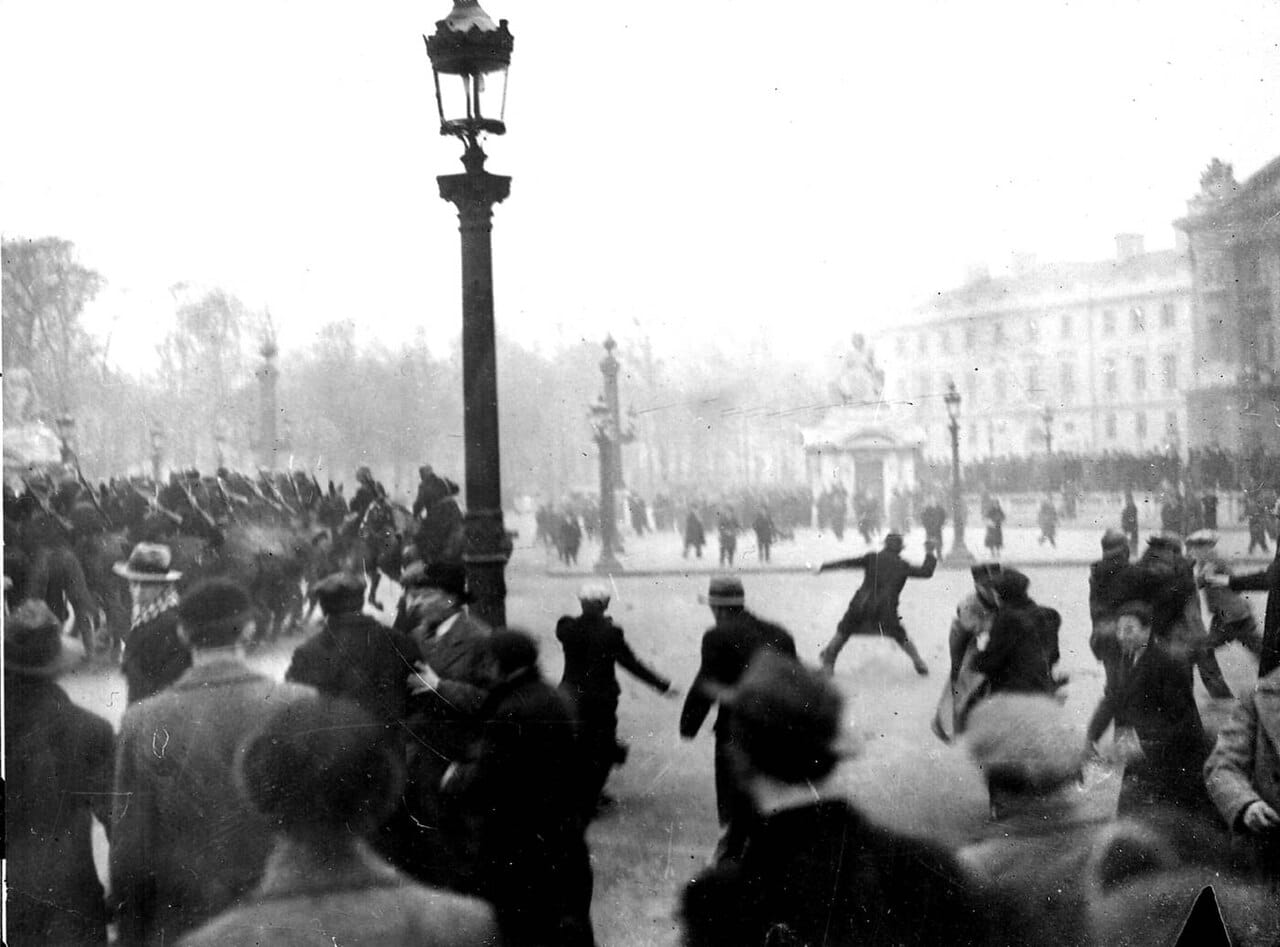
Here we have all the pieces for a far more dramatic corruption scandal, one which brought down a left-wing bourgeois government, involved open fascist street mobilizations, saw Radical-Socialists thrown in jail and stripped of their elected positions for their involvement. Trotsky was of course present for the events, though attempted to keep a low profile as he was forced to in all his host countries. What was Trotsky’s politics here? To call for united front actions with the bourgeois politicians that were accused? To call to free the imprisoned Radical-Socialists? To proclaim their innocence? To build an alliance and common action with the Radical-Socialists to fight the (quite openly) anti-semitic, xenophobic, fascistic forces that toppled a government?
It is worth emphasizing how dramatically higher the stakes were here, compared to Cristina’s potential post in the state legislature, because it is precisely in this context that Trotsky emphasized the total REJECTION of Popular Front methods. While worker mobilizations against the fascists were clearly essential, tying the left to the corrupt Radical-Socialists would have been fatal.
If under far less dramatic circumstances than the rise of fascism, the left tails after bourgeois forces, how can you possibly expect these leaderships to have a correct position when the stakes, and the pressure, is real? It is hoped that drawing attention to this will help militants realize how dramatically distant from the political core of Trotskyist politics their leaderships have taken them.
Trotsky on the Affair and France
The Stavisky Affair and the subsequent surge of fascist organization was the context to the extensive intervention and focus on the French political situation by Trotsky from 1934 onwards. The general outline is present in a number of shorter writings from the period, but is perhaps most extensively consolidated in Whither France. Trotsky’s extensive description of the Radical Party in there is not all that distant from how one could describe the role of the Kirchnerists:
The Radical Party is the party with whose aid the big bourgeoisie preserves the hopes of the petty bourgeoisie in a progressive and peaceful improvement of its situation… They have brought about no serious social reform on behalf of the toilers nor could they have done so. It was not permitted by the big bourgeoisie which holds on to all the real levers of power, the banks and the Bourse, the press, the higher officials, key diplomats and the general staff.
From time to time the Radicals handed out petty alms to their clientele, especially on a provincial scale, and, with the help of these handouts, preserved the illusions of the popular masses. Thus it went until the last crisis.
Corruption, clientelism, progressive rhetoric and minor reforms which keep all the foundations of capitalist power intact. Dependency for this on an economic foundation which is no longer present. The Radical-Socialists were condemned politically by the dynamics of capitalism in France itself, and to chase after them would be like chasing after ones own political death.
The working-class party must occupy itself not with a hopeless effort to save the party of the bankrupts. It must, on the contrary, with all its strength, accelerate the process of liberation of the masses from Radical influence. The more zeal and the more boldness it applies to this task, the more surely and rapidly will it prepare a real alliance of the working class with the petty bourgeoisie. It is necessary to place oneself at their head and not at their tail. History is working quickly. Woe to him who lags behind!”
…
If the united front does not emerge from passivity or, worse still, if it enters upon an unworthy romance with the Radicals, then to the “left” of the united front, Anarchists, Anarcho-syndicalists and other similar groupings of political disintegration will be strengthened. At the same time apathy, precursor of catastrophe, will make headway.”
An unworthy romance is an apt description of what the “Trotskyist” parties of Argentina have entered into with Cristina Kirchner. It would never have occurred to Trotsky that his later day followers could be so passionately enamored of a bourgeois party. That anyone on the left could think to not just enter into an alliance with a bourgeois party, but to fight openly for the absolution of it´s blatantly corrupt figurehead. There is certainly no precedent to be found for this kindof support by Trotsky or the French Trotskyists for the extensive list of Radical-Socialists who ended up in jail cells as a result of their corruption.
History works more slowly now in Argentina than it did in 1930s Europe, but in a long view the patterns are not altogether distant. This is not the left’s first romantic affair with Kirchnerism - it is the most obvious offense in a slide that has accelerated ever since Macri won in 2015. The constitution of a de facto and now de jure Popular Front with Kirchnerism has left the doors wide open to the kind of apathetic catastrophe in which the Argentine working class currently finds itself.
Argentina Today
Historical analogy has its limits, and Argentina is in a very different context than the France of the 1930s. Precisely for being far less grave, one would think it would be far easier and more important to maintain the fundamental principles of class independence. After all, if in the face of fascism’s great rise one was not to ally with Bourgeois parties, surely it makes even less sense now? If you can’t count on a workers party to take the hard decisions when the cost is low, how could you possibly expect them to do so when its hard? It is easy to forget how dramatically unpopular and yet politically necessary was Lenin’s call to organize for an insurrection against Russia’s first, popular, democratic, revolutionary government.
The well cited recent example of Lula’s case is distinct. As an important starting point, the PT is a bourgeois workers party, not unlike the Labour Party in its early years. Lula himself was a trade union bureaucrat, however treacherous his support of the bourgeoisie was, his origin is within the workers movement. Cristina has never been anything else than a bourgeois cadre of a thoroughly bourgeois party.
Lula was widely viewed as the potential presidential candidate for the PT, and was favored to win. His proscription came at the end of a whole series of undemocratic judicial and legislative maneuvers that had pushed the PT out of power. The case against him, including the infamous discussion of renovations at an apartment which he could not be proved to own, was exceptionally weak. While the PT has of course been mired in the corruption which is typical of Brazilian politics, there has been no evidence of substantial personal enrichment by Lula at anything like the scale clearly on display with Cristina.
In Argentina the current political context is dramatically different. Cristina’s proscription is not even clearly in Milei’s interest, though he will attempt to appropriate the judiciary’s condemnation as an achievement. There has been a defacto detente between Cristina and Milei where each has been using the other to reinforce their control of their respective political corners. The specter of Cristina has been invaluable in Milei’s struggle to swallow up the other right wing parties like that PRO, and it is to the sectors behind the PRO like Macri to whom the judiciary owes their allegiance more than to Milei.
Far from weakening Peronism, the decision is likely to motivate the Peronist base. Whether it resolves the current leadership divide in favor of the current governor of the Province of Buenos Aires, Kicilioff, is yet to be seen. But the only practical impact of the judgement is that Cristina is no longer a potential Presidential candidate in 2027 - a prospect that seemed extremely unlikely to succeed. As mentioned, she could not head the ticket for her own unpopularity in either 2019 or 2023. With the clientelist networks which depended on her in power weakening, it is hard to imagine that she would be a viable political candidate for Peronism.
Whither the Argentine Left?
The slavish support of the Argentine left to an ex-president who oversaw a state which saw leftists disappeared (Julio Lopez) or murdered in cold blood by Peronist thugs (Mariano Ferreyra) comes as a shock even to many on the periphery of these organizations.
Argentina under the Kirchners developed a very particular form of stability to secure the conditions of Argentine capitalism. The best historical precedent can perhaps be sought in the make-work “national workshop” system which briefly reigned after the 1848 revolution in France. The system of unemployed organizations, whether from the left or Peronist, were co-opted into the clientelist structure of the state. Capacity to mobilize in the street was the key to negotiating this aid, and the organizations had a continued role as an intermediary with the state in distributing it. It was an improvised response to the discontent which allowed stability after the post 2001 chaos. Thanks to the commodities boom, Argentina could afford it and it worked to restore order and domesticate the social movements.
Alongside the integration of the long term unemployed, there was an effort to finance and hegemonize a sector of the petty-bourgeois. Financing cultural centres, films, expanding universities and the whole sector of state and local employees. It is from this that Kirchnerism adopted its “progressive” guise on social issues and with which it continues to hold sway in some of its last bastions in Buenos Aires - the “Palermo” left - the typical progressive petty-bourgeois.
This Kirchnerist structure had room for the left: the PO and MST as well as a number of other left organizations which were able to grow and thrive, superficially, with their massive piquetero (unemployed) organizations. Their cadre, trained in the universities, often found work in the new universities, the expanded state apparatus or as teachers where new “progressive” curriculums were allowed even as salaries, budgets and standards fell. State resources and unemployment aid was given out, more or less directly, in relationship to the capacity of organizations to mobilize in the street. Even the expropriated, co-operatively run factories were brought in under this logic, kept aloft not by their productive power but by poverty salaries and state subsidies. Mobilization had very concrete gains and rewards against the backdrop of unemployment. This encouraged participation and allowed the left to grow and operate within this redistributive logic.
This structure and logic, a fairly unique and peculiar one for bourgeois states, is dying. The street protests which confronted Milei earlier this year were as substantial and violent as those which defeated Macri in 2017 – yet they have proven politically impotent. Peronism lies totally discredited by the debacle of the Fernandez government, and without Peronism being a viable alternative, the street protests achieve little. This demonstrates that a strong Peronist opposition was not the force which “co-opted” the protests in 2017, it was the condition of their “success”. Violent street protests can at most create pressure to topple a government, but can only do so if there is another political force ready to step in and handle the reigns. A genuine alternative would depend on workers power and working class leadership. But that decisive level of power cannot be found among the unemployed, students, teachers, state workers or even many of the workers in Argentina's highly protected, subsidized industries. It must be found among workers in the key productive sectors on which the Argentine economy rests. Sectors in which the left has been absent or in decline.
The Argentine left is now facing a reality – one familiar to leftists in much of the world – where you can organize a large protest and the bourgeoisie simply doesn’t care. If you're not causing economic damage or say, seizing the Casa Rosada, it can largely be ignored. Repression of street protest returns and is capitalized on as a spectacle by the governing right party. What feels like “fascism” for some of the Argentine left is simply the normal state of affairs in most modern bourgeois democracies. The organizations which the left built in the period of Kirchnerism reflect that previous redistributive order, and increasingly seem destined to die with it. They are desperate to resurrect that order, desperate for a Peronism that will “struggle” and in whose wake they can retain political relevance.
Unfortunately in their descent to ever deeper levels of degradation, they are making a mockery of the fundamental political principles of Marxism and class independence. Trotskyism is viewed as a more pure and more progressive Kirchnerism, rather than a subversive threat to the capitalist order. The Fourth International was born in opposition to the Popular Front, yet the major Argentine Trotskyists compete with one another to see who can adapt most totally to a bourgeois party.
This is a crime, those who have led our class to it must be denounced, criticism must be unrelenting, and the organizations of the left must be broken down and reconstructed on the basis of a genuine revolutionary politics.
